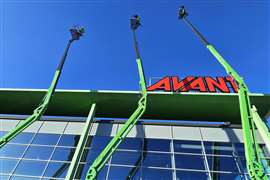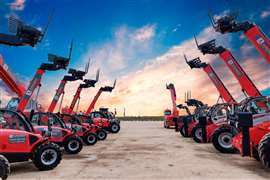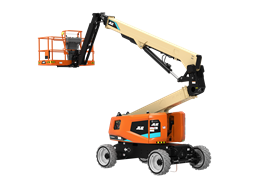Read this article in Français Deutsch Italiano Português Español
Access rental takes many paths to continued growth
22 May 2024
With the acquisition of access specialist Riwal by European rental giant Boels in recent months, one could easily be convinced that in mature markets, large specialist rental companies will inevitably be consumed by generalists.
The view from Pedro Torres, Riwal’s CEO, following the deal’s announcement would seem to support this.
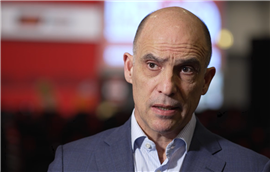 Pedro Torres, CEO of Riwal, speaks about the Boels acquisition.
Pedro Torres, CEO of Riwal, speaks about the Boels acquisition.
Torres told AI at the IAPA awards ceremony in Denmark, during March, that it would benefit both parties.
“It’s a good idea and it makes common sense that a specialist company is part of a larger group,” Torres added. “I think it make sense to have specialist and generalists together. If you have a size like Riwal, it is becoming more difficult because margins are suffering. [This is because] we have new entrants into the markets from manufacturers, with better conditions.
“The economy has not been that strong in the last year – steady but not like the last 10 years. So, it is about economy of scale.”
Expanding on Riwal’s decision to sell, Torres adds, “The owner of Riwal wanted to leave the company to another good company and Boels is a great company and we have similar values.
“We have passion for growth and Boels aims to duplicate its size every five years - they didn’t do that last year because they triplicated the size.”
Torres’ point about specialists doing well within a larger group is an interesting point and is supported by the COO of Loxam PAD, Paul Rankin.
The rise of the ‘specialist specialists’
Back in 2017, Loxam acquired access rental group Lavendon, but rather than integrate it fully into the group, the plan was to launch a separate entity called Loxam Powered Access Division, which takes the benefits of working within the group while keeping its own unique entity, demonstrating that while access equipment is a major rental product, it has a unique status - one that may complement a larger generalist group but prospers as a separate entity within it.
Digging deeper into the specialist realm, Rankin believes that in a tough economic environment, such as Europe, where the construction sector is currently down, it makes sense for either large generalists or even large specialist access rental companies to focus on the ‘specialist specialist,’ which falls outside of standard construction and therefore offers an alternative revenue stream.
The ‘specialist specialists’ refers to access-specific rental companies which concentrate in areas outside of the general construction rental model, perhaps in the van-mount or spider lift sectors or platforms of a certain height area, such as over 20m or 40m.
“You can look at the different product categories. For example, there are a few specialists with the big stuff – truck mounts, and spiders, and in different sectors, like film and TV. I think that is very appealing. “If you buy in one of those specific product groups, you move away from the dependency of construction.”
Two rental models meet customers’ needs
Speaking in this issue, Paola Palazzani, the new president of spider manufacturer Palazzani, believes the specialist access rental company has a place in its own right.
“There are two kinds of rental company,” says Palazzani. “One is the big generalists, like Boels, where there’s a machine for everybody. But that machine must be very quick and easy to learn – you don’t have to be a skilled operator.
“The second type of rental company, and one which has been our customer for many years, is the specialist service provider.”
These companies rent all the services required for a specific application type, like telecommunications or wind energy sectors, in which the spider is just one, yet essential item.
“They are rental companies, but they are very different from what we think about rental companies,” Palazzani says. “They have specialized tools for their needs and maybe two big spiders.”
Growing speciality divisions
Speciality rental goes far beyond access equipment of course, and the vision of the world’s two largest rental companies, United Rentals and Sunbelt Rentals, both based in the US, to grow
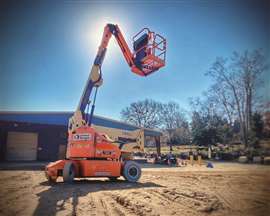 United Rentals is moving further into speciality rental.
United Rentals is moving further into speciality rental.
their speciality divisions, has the same philosophy at its core.
In March, United Rentals completed the acquisition of temporary roadway rental business Yak Access, Yak Mat and New South Access & Environmental Solutions from Platinum Equity for $1.1 billion in cash.
The next month, in April, United upgraded its full-year forecast following the first quarter, which revealed a 7% increase in revenues when compared with the first three months of 2023.
Its specialty division saw the biggest increase at 19%, accounting for $859 million (€798 million) in first quarter of 2024.
On the subject of the buyout and the potential of speciality rental, Matthew Flannery, CEO of United Rentals, said, “Our acquisition of Yak provides another excellent example of our strategy to grow our specialty rental business, differentiate our one-stop-shop capabilities and capitalize on both secular growth and cross-selling opportunities.”
Specialty rentals is a key objective of Sunbelt’s parent company Ashtead too, which forecasts that this part of the business could represent US$5 billion in revenues by the end of its five-year plan. Growth opportunities are seen especially in power and HVAC, climate control and flooring solutions.
Emerging generalists
Coming back to access rental and the place of specialists in the modern market; does all this mean that in an ever more competitive world, generalists are bound to increasingly dominate the access rental scene, with access specialists tending to be more localized or application specific?
Guilherme Boog, CEO of Loxam in Brazil, spoke this month about how the fast-expanding rental market in the country is going through a consolidation process, grouping medium-sized companies under the umbrella of big corporations.
 Sergio Kariya, Mills’ CEO, plans to continue on the acquisition trail.
Sergio Kariya, Mills’ CEO, plans to continue on the acquisition trail.
Brazil is a large country, that alone is equivalent to 85% of the geographical area of Europe, and it might be difficult for small companies to reach the most remote areas, says Boog. “With a big company behind us, able to exchange equipment depending on local spot demands, it might be easier and quicker to establish a rental culture at such locations.
“This process is positive because this raises the bar in quality, offers and allows a de-centralization, allowing large companies to get to more distant areas,” he says.
Remaining in Brazil, the country’s largest rental company, Mills, has taken the opposite path to United and Sunbelt by being a specialist access company that has expanded into a generalist. However, the same reasoning lies at the heart of the plan.
Mills reported a 25% increase in revenues for the 2023 financial year, reaching record net revenues of R$1.4 billion (€266 million).
The company said the rise was partly down to its strategy to invest in its heavy rental fleet, with Mills quadrupling its fleet size in the segment in 2023.
And it follows the acquisition of earthmoving rental company Triengel Locações e Serviços (Triengel) in 2022, at which time the company ended its days as an access specialist and said it would “accelerate the move into the yellow line equipment market.”
Meanwhile, revenues from its formwork and shoring business were up by 53% in 2023.
Sergio Kariya, CEO of Mills, said, “We proved the thesis of investing in the heavy rental market, bringing greater diversification, cash flow predictability and a new avenue of growth for the company.”
Kariya added that the company is expecting to continue its growth path this year.
“Our engines are running hot for 2024 and we believe that this year will be another year of profitable growth, reinforcing our strategic positioning and competitive advantages.”
Taking steps toward responsibilityIn another example of how mature rental companies are taking the next step in sustainability through new responsible business initiatives, is Kiloutou.  Olivier Colleau, CEO of Kiloutou Group. Olivier Colleau, CEO of Kiloutou Group.
Growth in international markets helped Kiloutou increase its revenues by 18% to €1.2 billion in 2023. Kiloutou said it had seen growth in all seven of its European markets – France, Poland, Spain, Germany, Italy, Denmark and Portugal. Olivier Colleau, Kiloutou’s CEO, said 2023 had been both turbulent and remarkable for the company; “This performance confirms the solidity of our business model and the relevance of the strategy we have adopted.” Fleet decarbonization The company is pursuing a “voluntary transition program” in relation to decarbonization. A third of its fleet investment in 2023 was earmarked for low emission equipment. In France, it has a dedicated iMPAKT low emission product range and said it “aims to gradually roll out a low-emission range in its various markets from 2024.” The company is also decarbonizing its own fleets for service, breakdown and delivery. It added a 32-tonne electric heavy truck to its delivery fleet in the summer of 2023, and expects that 27% of its vehicle renewals in 2024 will be decarbonized. In terms of digital developments, it launched its Youse and Konnect services and relaunched the kiloutou.fr website. “The fluidity sought between the digital experience and the in-branch experience is bearing fruit: turnover generated on digital channels in France has risen by 54% in one year,” the company said. Kiloutou said 2024 would be “rich in opportunities, but also in challenges. The economic environment is still marked by inflation and the emergence of sectoral and geopolitical crises likely to disrupt the construction and civil engineering companies. “Faced with these challenges, equipment rental is proving to be a real solution for construction companies: first, by enabling them to optimize their cost structures and, second, by offering them low carbon equipment that is still more expensive to buy.” |
STAY CONNECTED



Receive the information you need when you need it through our world-leading magazines, newsletters and daily briefings.
CONNECT WITH THE TEAM










